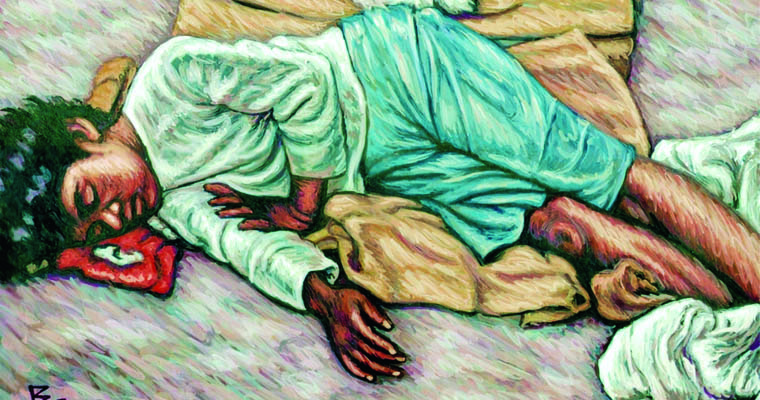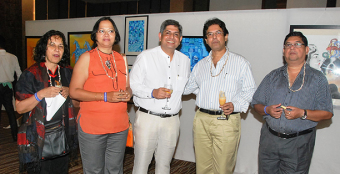We see them all the time. Begging on the streets, sleeping under bridges or approaching our vehicles with outstretched palms. Most of us do our best to keep them at bay. One recent afternoon, pill however, Streets correspondent Anzil Fernandes decided to approach a few of them. What he heard outside the Margao Railway station will stay with him for a long time. This is the story of Fazlu, Atif, Altaf and Sanjit. Some might call them thieves or pickpockets or drug addicts. Underneath it all, however, lies some very scared children.
They are like blood brothers. Especially, when they share a fix of ganja, stuff it in a chillum and smoke it in tandem.
For Fazlu, 16, a school dropout and Atif 17, a street kid from Margao, the dull marijuana smoke fuels the cloud of uncertainty in which they live.
Fazlu dropped out of school in Class IV and is on the streets now. He hates his father who admitted him to a state run children’s home, from which he’s escaped.
Atif, an orphan, lives with his brother in a hut under the elevated tracks of the long abandoned model Sky Bus, part of an ill-fated railways project aimed at modernising rail commuting.
Fazlu and Atif, both children of migrants from Karnataka, have been out of school for years, despite India’s two-year-old Right to Education act, which makes education compulsory for children up to the age of 16.
Education for them now is about survival and making do with every hour.
Fazlu told me his story in what they call an “adda”, or den, under a banyan tree. From a middle class family, he topped school, until he landed at the children’s home Apna Ghar three years ago. He blames bad company and, in a surprising bit of self-awareness, his own temper for getting into trouble.
“I agree I was a little naughty but I don’t know why they admitted me there,” he says. Home, he said, wasn’t an option, because he doesn’t want to be anywhere near his father, who has remarried since his departure.
“I don’t want to go there, that’s not my house,” he said, rage in eyes. He avoids any discussion of his mother, and I was unable to surmise where she might be.
He took small breaks in his story-telling. During one of these, he fished out a packet of some dry green herbs, which he said was ganja. He placed some in his palm, crushed it with his thumb, carefully removed any seeds and rolled a joint with tobacco from a cigarette.
His friend Atif gave him a small chillum made from coconut leaf, in which the fix went. He lit it, took three continuous puffs and passed it onto his friend.
Atif was recently arrested for stealing a gold chain. He has been asked to report to the police station regularly since, but he isn’t interested. He says he wants to go to school, but doesn’t because his brother, who has bailed him out of various sticky situations, attends the same school.
“How can I show my face to my brother?” he asks. “I want to learn and at the same time I also want to work, please help me.” With that statement, young Atif breaks into tears.
At the adda, the teenagers are now joined by two other friends, Altaf, 12 and Sanjit, 14. With the smell of the ganja smoke as our olfactory backdrop, the two immediately tell me about their preferred fix, white ink and rubber-based adhesive, which are cheaper than weed.
“We pour the whitener on a piece of cloth and sniff it … then we go into coma like … you feel nice and you get super energy,” says Altaf.
The twelve-year-old is not afraid of death and lives by this motto: “Sir, everyone has to die. If this is the way I have to die, so be it.”
Finding avenues of escape is a key part of these youngsters’ lives, and one of those avenues is Hindi cinema. Fazlu compares his friendship with Atif with the inseparable bond shared by Jai (Amitabh Bachchan) and Veeru (Dharmendra) in Sholay, one of India’s most iconic films.
The Margao-based social organisation Jan Ugahi, has been seeking to help youngsters like Altaf, Sanjit, Atif and Fazlu by gradually trying to wean them away from the life of a vagabond and toward learning a skill and vocation. But it certainly isn’t easy, says Fatima Balamid, the non government organisation’s spokesperson.
The 16-year-old Fazlu, she said, was involved in a relationship with another similarly aged girl, who delivered a baby some months back.
“Fazlu has refused to accept the girl and her child,” Fatima said. The minor girl has now been pushed into prostitution.
Fazlu has perhaps buried the fact deep in a deep crevice in his conscience. He continues to give me lessons on survival out on the street.
“Being on the street you have to learn these things or else you won’t survive. If you want ganja you tell me, I’ll get it for you,” he offers.
Jan Ugahi can be contacted at
Jan Ugahi Trust
V-19, Vikrant, Malbhat, Margao
Goa 403 601
janugahi@gmail.com
janugahitrust@yahoo.com
+918322737167
(Names of the minors have been changed to protect their identity)




